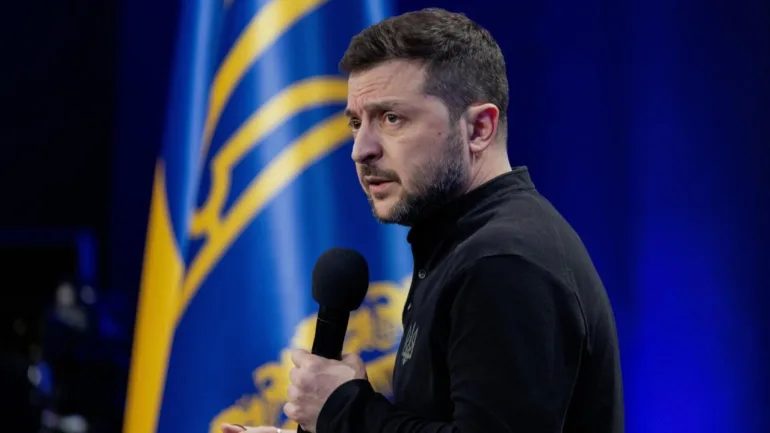On the eve of the third anniversary of Russia’s invasion of Ukraine, President Volodymyr Zelensky declared his readiness to step down if it would secure Ukraine’s membership in NATO.
Zelensky, who has faced mounting criticism from the new U.S. administration, expressed a desire to meet with former President Donald Trump before Trump meets Russian President Vladimir Putin.
Zelensky has long called for Ukraine to be granted NATO membership as part of any agreement to end the war, but the Washington-led alliance has been hesitant to make such a commitment. Speaking at a Kyiv press conference, Zelensky stated, “If there is peace for Ukraine, if you really need me to leave my post, I am ready… I can exchange it for NATO.”
The Ukrainian leader’s comments come amid rising tensions with Trump, who has recently criticized Zelensky. Trump labeled him a “dictator,” falsely claimed that Ukraine “started” the war, and asserted, despite contradicting polls, that Zelensky was unpopular in Ukraine. In response, Zelensky stated he was not “offended” by Trump’s remarks and was prepared to test his political standing once martial law in Ukraine is lifted.
“If he were a dictator, one would be offended by being called one,” Zelensky remarked, adding that he hoped for mutual understanding with Trump. “Security guarantees” from the U.S. president, he said, were “much needed.” He also urged Trump to meet with him before any summit with Putin. Zelensky highlighted progress on a potential deal to provide the U.S. with preferential access to Ukraine’s vital resources.
Meanwhile, the Kremlin expressed optimism about dialogue between Trump and Putin. Kremlin spokesperson Dmitry Peskov described the two leaders as “extraordinary” and emphasized the importance of realizing the political will of both heads of state.
However, despite Zelensky’s calls for long-term security assistance and Trump’s discussions of a peace deal, it remains unclear if U.S. diplomatic efforts can bring Moscow and Kyiv closer to a ceasefire. Peskov ruled out territorial concessions as part of any settlement and reaffirmed Moscow’s rejection of NATO membership for Ukraine.
“The people decided to join Russia a long time ago,” Peskov stated, referring to disputed votes in eastern Ukraine during the ongoing conflict, which have been dismissed as fraudulent by Kyiv, the West, and international observers. “No one will ever sell off these territories. That’s the most important thing,” he added.
On Sunday, UN Secretary-General António Guterres called for a peace agreement that upholds Ukraine’s “territorial integrity.”
In a speech marking the anniversary of his “special military operation” in Ukraine, Russian President Vladimir Putin framed the conflict as a mission ordained by God. “Fate willed it so, God willed it so,” Putin said, addressing Russian servicemen who have fought in Ukraine. “A mission as difficult as it is honorable—defending Russia—has been placed on our and your shoulders together.”
Overnight, Russia launched a record 267 attack drones at Ukraine, though Kyiv’s air force successfully intercepted or shot down almost all of them, with no significant damage reported.
As Russian forces continue their aerial assaults and make gains on the battlefield, Moscow has taken advantage of the diplomatic rift between Trump and Zelensky. “Zelensky makes inappropriate remarks directed at the head of state. He does it repeatedly,” Peskov said. “No president would tolerate that kind of treatment. So his [Trump’s] reaction is completely understandable.”
In related developments, Russian and U.S. diplomats are expected to meet next week following talks in Riyadh between Russian Foreign Minister Sergei Lavrov and U.S. Secretary of State Marco Rubio. French President Emmanuel Macron and British Prime Minister Keir Starmer will also travel to Washington this week to advocate for continued support for Ukraine. Additionally, European Council President Antonio Costa announced a special European summit on the Ukraine war scheduled for March 6.
“We are living a defining moment for Ukraine and European security,” Costa wrote on X.
AFP


